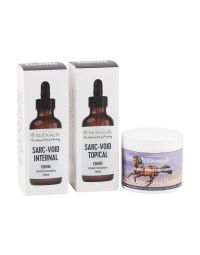Warts - also known as equine papillomas - are usually small, benign skin growths caused by the equine papillomavirus (EPV). While often harmless, they can be persistent and troublesome, especially if they appear in sensitive or tack-bearing areas.
What Are Horse Warts?
Appearance: Rough, cauliflower-like bumps (0.2–2 cm), typically grey, pink, or flesh-toned, found on the muzzle, lips, eyelids, ears, pasterns, genital area, and sometimes pasterns
Who it affects: Most common in horses under 3 years of age; older horses usually develop immunity.
Transmission: Through direct nose-to-nose contact, shared equipment, water troughs, tack, grooming tools - and even via biting insects
Are Warts Dangerous?
Generally benign and often resolve on their own, usually within 1–9 months, as the horse’s immune system responds. Rarely, certain papillomas - especially near genital areas - can progress to squamous cell carcinoma.
Veterinary diagnosis (exam or biopsy) helps to distinguish them from other skin growths like sarcoids or cancerous lesions
Holistic & Practical Management
Most warts clear up without intervention - especially in young, healthy horses. Maintain a balanced diet, good overall health, and plenty of movement to support immune function.
Hygiene & Environmental Management
- Isolate affected horses and assign them separate buckets, tack, and grooming gear
- Sanitize water troughs, tack, and shared surfaces
- Use insect repellents and fly masks to deter transmission by bugs
Supporting treatments via McDowells
When warts persist or cause discomfort, our herbal line offers gentle support:
Sarcoid Program
Designed to support the immune system in addressing viral growths, including warts. This holistic formula gently encourages the body to process infection, rather than mask symptoms.
Sarc-Void Ointment
A rich topical herbal blend intended to condition skin, reduce growths, and support the body’s natural expulsion of papilloma tissue. Though designed for sarcoids, it’s effective for stubborn warts too.
Infect-A-Clear
A powerful blood-purifying formula featuring liver, lymphatic, and immune-support herbs. Supports systemic cleansing and helps the body more efficiently release viral or inflammatory debris.
Veterinary & Advanced Options
If warts are painful, bleeding, or very persistent, veterinary care can include:
- Topical treatments (keratolytic creams, over-the-counter ointments, antiseptic lotions)
- Cryotherapy or surgical removal for larger or problematic warts
- Immune-based therapies such as autogenous vaccines, especially in recurrent or congenital cases
Building long-term wellness
- Balanced nutrition (high-quality hay, pasture, and minerals) strengthens immunity.
- Stress management (consistent routines, turnout, low-pressure training) supports overall resilience.
- Gentle physical exercise improves circulation and lymphatic flow.
Case Study Snapshot
Bella the 2-year-old pony developed warts on her muzzle and girth area. Despite good health, her immune system took six months to clear them naturally. We supported her with the Sarcoid Program, Sarc-Void Ointment, and topical antiseptic for scabbed lesions.
Result: Warts subsided faster, skin healed smoothly, and no recurrence occurred over the next year.
Final Thoughts
Warts in horses are a common, usually harmless viral condition—especially in young equines. A balanced approach supports nature’s healing path:
- Observe and maintain a healthy horse environment
- Use McDowells herbal products to support immune, lymphatic, and skin health
- Seek veterinary help for persistent, painful, or suspicious lesions
Need tailored advice?
Every horse and every pasture is different. If you’re facing a tricky wart case or feeling uncertain about the best treatment route, we offer free consultations to guide you toward a fully supportive, natural approach aligned with your horse’s needs.
